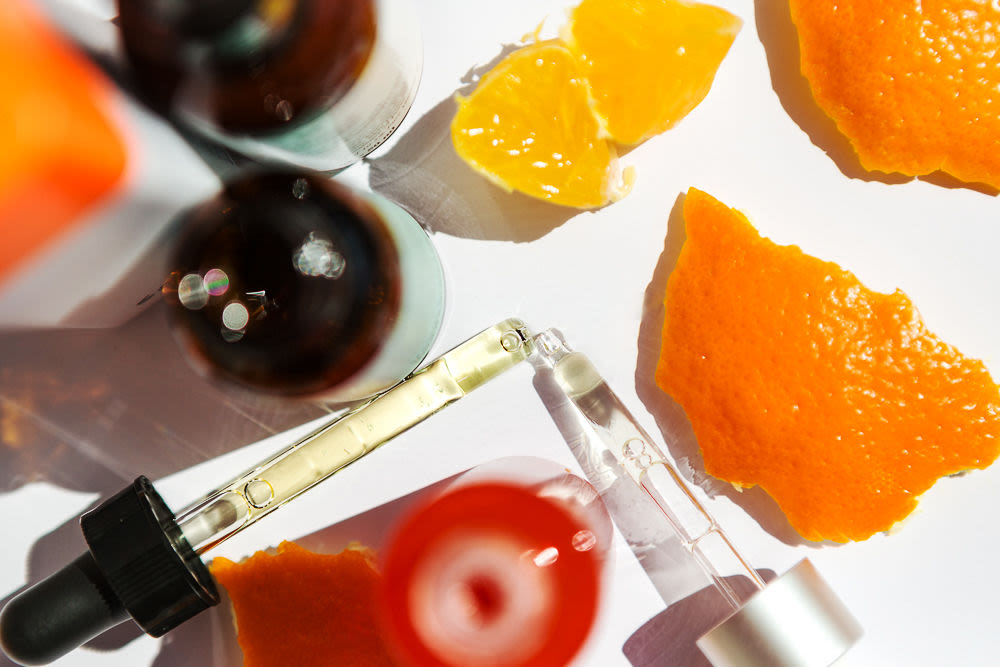Vitamin C is the best. It evens pigmentation, brightens, and adds some antioxidant protection under sunscreen. What’s not to love?
Well... it tends to be a little… unstable. Vitamin C is notoriously difficult to get right; when it’s dissolved in water, it becomes sensitive to light (like the one in your bathroom) and air (which is... everywhere). Once it gets exposed to light and air vitamin C starts breaking down, and you’ll know it’s gone bad when it not only stops doing all those things you bought it to but also tints your face/clothes/pillows like a bad fake tan. The specific form of vitamin C I’m talking about is L-ascorbic acid, because it’s the strongest and the most well-studied. There are derivatives that are more stable, and while those derivatives are great, they’re ultimately less powerful. So, what’s a vitamin C stan to do? If you’re tired of choosing between strength and stability, maybe try a vitamin C powder instead.
“To be clear,” stress cosmetic chemists Gloria Lu and Victoria Fu, “we’re not saying that vitamin C serums aren’t effective. But the biggest advantage with vitamin C powder is superior stability.” Because really, what’s throwing the wrench into the situation is the liquid solution used to make a serum. “L-ascorbic acid is significantly more stable in dry powder form, which means a better shelf life.” To use them, you’ll just add a little into skincare you already have—some come with a spoon to use, but if yours doesn’t, start out with a tiny bit and work up to find the right amount. I scoop out my powder with a little spatula, and put about the equivalent of a pinch of salt right into the palm of my hand. Then I add in a pump or so of whatever I’m going to mix it with (most recently CeraVe lotion), swirl it around, and apply all over my face.
But not all vitamin C powders are created equally, so I sent the chemists the ingredient lists of all the most readily available versions to help me wade through it. First, they cut out every powder that used an L-ascorbic derivative instead of the real thing. “They’re either fairly stable, so you don’t get an added benefit to having it in powder form,” they explain, “or less effective than L-ascorbic.” They also recommended avoiding formulations with water-loving ingredients in high quantities—these mess with the powders’ ability to stay fresh, particularly in humid locations like a bathroom. Out of everything, here are the vitamin C powders they loved the most.
True Botanicals Vitamin C Booster and The Nue Co. Topical C
The Ones With Ferulic Acid
These two vitamin C powders are pricey, but the added cost comes with an addition of ferulic acid, too. “Ferulic acid works synergistically to offer better antioxidant protection, like in the classic CE ferulic serums,” say Gloria and Victoria. As this study shows, the addition of ferulic acid can amp up vitamin C’s effectiveness significantly. “The Nue Co. added some soothing ingredients, but it’s pretty similar to the True Botanicals,” confirm the chemists. If you’re choosing between the two The Nue Co.’s might be better for sensitive skin (and it’s slightly cheaper).
The Ordinary 100% L-Ascorbic Acid Powder
The Budget Pick
The Ordinary’s vitamin C powder is L-ascorbic acid and… that’s it. On the one hand, you’ll be getting the most pure, concentrated form of vitamin C there is. But on the other, you’re missing out on the soothing, boosting ingredients you might find in other powders. “There’s nothing wrong with using just pure ascorbic acid, but we do recommend starting with just a small amount,” recommend the chemists. “Pure L-ascorbic acid is fairly acidic, and you'll want to make sure your skin can handle it before using more.”
Philosophy Turbo Booster C Powder
The Sensitive Skin Option
Apart from having the silliest name on this list, Philosophy’s vitamin C powder adds zinc and copper, two ingredients to soften the blow of good ol’ L-ascorbic. “This ingredient list is pretty great,” offer the chemists. “Other than ascorbic acid, all the other ingredients either enhances the moisturizing or soothing property of the powder.” They also note the inclusion of arginine, which makes the powder less acidic (read: less harsh on skin). Because of its high concentration of water-loving ingredients, though, Victoria and Gloria note to try and store it in a dry place to make sure the shelf life stays good.
Once you have your powder, choose the right thing to mix it with. “You can mix it with a toner, but because the formulas are so thin it can get messy,” say Gloria and Victoria. “You can also mix with light lotions, but the low pH of the powder might actually ‘break’ the lotion formula—you’ll know it’s happening if the consistency starts to look questionable.” The chemists recommend mixing vitamin C powder with a hydrating serum that’s more viscous than a lotion but less than an essence. You’ll basically be making your own vitamin C serum every single day. How’s that for fresh juice?
—Ali Oshinsky
Shop the best vitamin C powders, from cheapest to most expensive:
Photo via ITG

